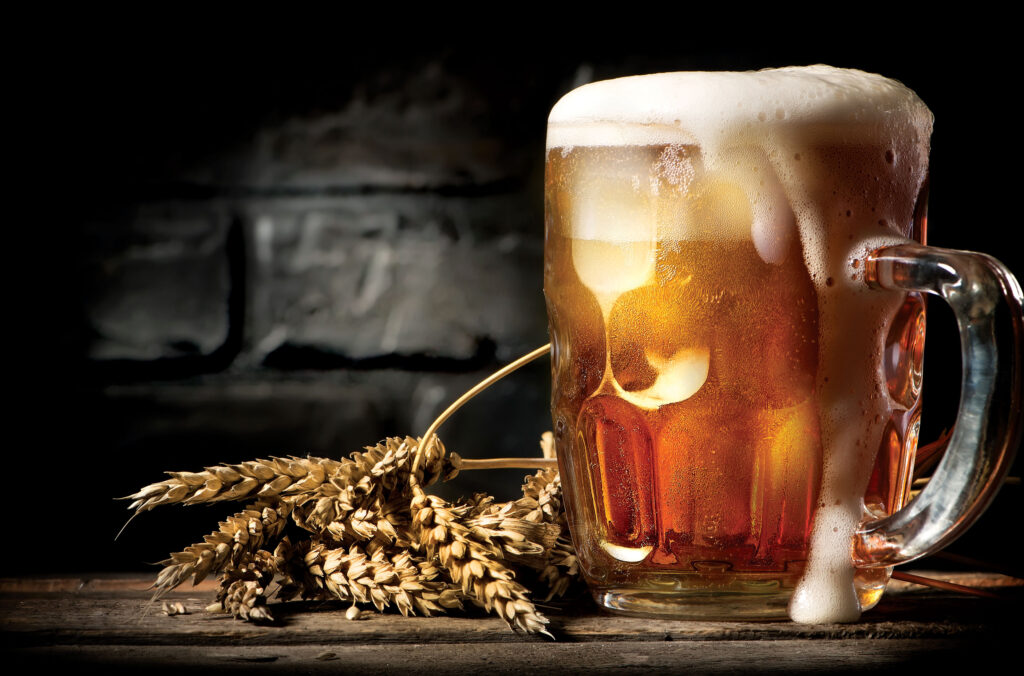Advertisement
Make It Organic Beer
Raise a glass

As the craft beer revolution sweeps across Canada, consumers are becoming increasingly savvy about the authenticity of the beers they drink, which leads to a growing demand for certified organic beer.
Advertisement
Can beer be organic?
Can beer actually be certified organic? Isn’t it produced in industrial production facilities? Fermentation itself is an organic process: brewers prepare a malty and hoppy liquid stew called “wort” to which they add yeast, which converts the sugars into alcohol and carbon dioxide, with beer as the result. To call it “organic beer,” at least 95 percent of the ingredients must be certified organic.
Advertisement
What does it mean to be organic?
Most beers are made from four ingredients: water, malted grains (mainly barley), hops, and yeast. Water (which is exempt from organic certification) and barley make up more than 95 percent of most beer recipes, so an organic beer can be brewed without organic hops or yeast.
That said, since hops play such a prominent role in beer’s flavour, most organic breweries use organic hops. Organically produced yeasts are still somewhat rare, but since yeast amounts to a miniscule percentage of an overall batch of beer, few organic breweries are sticklers about using it.
In other words, organic beer is produced using certified organic malts and hops (as well as any other added ingredients such as fruit, sugars, and spices). These are generally scarcer and more expensive than conventionally produced grains and hops, and certain varieties are simply not available.
Advertisement
Where can I source organic beer?
Despite these limitations, six Canadian craft breweries have chosen to go the all-organic route: Crannóg Ales, Dogwood Brewing, and Nelson Brewing in British Columbia; Beau’s All Natural Brewing in Ontario; and Microbrasserie Le Castor and Brasserie New Deal in Québec.
Crannóg Ales
The first organic brewery to open in Canada was Crannóg Ales, which is located on a 10-acre farm in Sorrento, BC. For Rebecca Kneen, who co-founded the brewery in 2000 with her partner Brian MacIsaac, the choice to go organic was clear.
“I didn’t want to make the land and water sick by treating it with chemicals,” she explains.
But it was definitely challenging to get organic ingredients back then. Canadian malts were available, but the only organic hops on the market were from New Zealand. This inspired Kneen to plant an acre of hops on the farm, something that ultimately led her to produce an online manual on hop-growing that in turn inspired others to plant hops.
Nelson Brewing
For Nelson Brewing, which opened in 1991 as a conventional brewery, the decision to go all-organic in 2006 was a reflection of the progressive city in which it is based.
“Organic is not so niche in Nelson,” explains Jerry Grant, who became brewmaster there after a change in ownership earlier this year. “It’s kind of mainstream here, so it really reflects our community.”
Grant acknowledges it is a lot more work to brew organically: “It adds an extra layer of paperwork and bureaucracy. A lot of my time is spent on the paper trail, following our ingredients from the farm to us.”
Beau’s All Natural Brewing
The same year that Nelson Brewing switched to organic, Beau’s All Natural Brewing opened in Vankleek Hill, Ontario, halfway between Ottawa and Montreal. Steve Beauschene, who co-founded the company with his father, Tim, says going organic was a decision they made on “the very first day” they talked about opening a brewery.
“I simply felt that we could make better beer,” says Beauschene.
Beau’s is a corporate success story, growing by 45 percent per year in its first decade, but Beauschene believes it is important to plan for growth sustainably: “Making sure you can actually achieve what you want to, but setting goals to improve as you grow.”
Microbrasserie Le Castor
Just 20 minutes away across the provincial border in Rigaud, Québec, is Microbrasserie Le Castor, founded by Daniel Addey-Jibb and Murray Elliot in 2012 when business was slow for their timber-frame construction business. The brewery started in a 600-square-foot area of Hamlet Heavy Timberwork’s warehouse, but over the next two years it took over the entire space, and now the brewery is their full-time job.
“The decision to go organic was simply an extension of the philosophy we had on the woodworking side of things, where we used sustainably harvested wood,” Addey-Jibb explains. “What’s the equivalent in brewing? It’s going to have to be organic ingredients.
“It was just a no-brainer for us. It had nothing to do with marketing.”
Indeed, most of Canada’s organic breweries choose to let the beer speak for itself rather than trumpeting its organic qualifications.
Brasserie New Deal
“I think consumers are looking for companies that have the same values as they do,” Brasserie New Deal’s Jean-François Giguère says. “Every time they buy something, it’s a vote. They’re looking for products where every dollar makes a difference.”
New Deal opened in Boucherville, a suburb of Montréal, in late 2016, producing its organic line-up under the Boldwin brand.
Dogwood Brewing
Back in BC at Vancouver’s Dogwood Brewing, which opened in 2015, owner and brewmaster Claire Wilson echoes the idea that “people are looking for authenticity.”
“Be true about what you’re doing,” Wilson believes. “I think customers appreciate it. It’s hard to believe that as one person you make an impact, but when you’re a company and you’re spending thousands of dollars every day, you really see the impact of where you’re spending your money.”
As for why she chose to brew organic beer, Wilson pictured herself in two decades.
“What am I going to be proud that I did? Making the best beer with the best local ingredients,” she says.
And rather than feeling that her choice of ingredients is limited by organic options, Wilson says, “We created our beers around the ingredients we have here.” Dogwood, named for BC’s provincial flower, uses local ingredients first and foremost, including organic hops from Lillooet and organic malts from Armstrong’s Gambrinus Malting.
Proudly organic and delicious, too: cheers to Canada’s organic breweries.
Organic beers from conventional breweries
- Granite Brewery Greenman Organic Pale Ale (Halifax)
- Microbrasserie La Barberie Blonde Biologique (Québec City)
- Mill Street Brewing Organic Lager (Toronto)
- Picaroon’s Dooryard Summer Ale (Fredericton)
- Propeller Brewing Organic Blonde Ale (Halifax)
Organic hops on the rise in BC
 Although hop farms were once a major part of BC’s agriculture industry, blanketing huge swaths of the Fraser Valley in the 1950s, hop growing nearly disappeared entirely by the 1970s. Led in part by Rebecca Kneen’s efforts at Crannóg Ales, the province is enjoying a small renaissance in hop cultivation.
Although hop farms were once a major part of BC’s agriculture industry, blanketing huge swaths of the Fraser Valley in the 1950s, hop growing nearly disappeared entirely by the 1970s. Led in part by Rebecca Kneen’s efforts at Crannóg Ales, the province is enjoying a small renaissance in hop cultivation.
Of note on the organic side is Lillooet’s Harvesters of Organic Hops (HOOH), which has 15 acres of organic hops cultivated in its Fraser Canyon network, and also acts as a processor and distributor for Organic Hops BC (OHBC), a network of organic producers located throughout BC.
 Farm to table at the beer farm
Farm to table at the beer farm
Although not certified organic, Persephone Brewing is based on an 11-acre farm in Gibsons, BC. The so-called “Beer Farm” grows its own hops as well as vegetables and apples, all using organic growing practices.
There are beehives and chicken coops, and the harvest is used in beers and food produced by Farm to Feast, an Airstream trailer turned food truck parked on site. The Beer Farm also hosts long-table dinner events featuring locally grown and foraged foods paired with Persephone’s beers.
Persephone also partners with the Sunshine Coast Association for Community Living to give work opportunities to people with developmental disabilities. The brewery is the first and only certified B-Corp brewery in BC, a designation it shares with Beau’s All Natural Brewing in Ontario and Brasserie New Deal in Québec.





